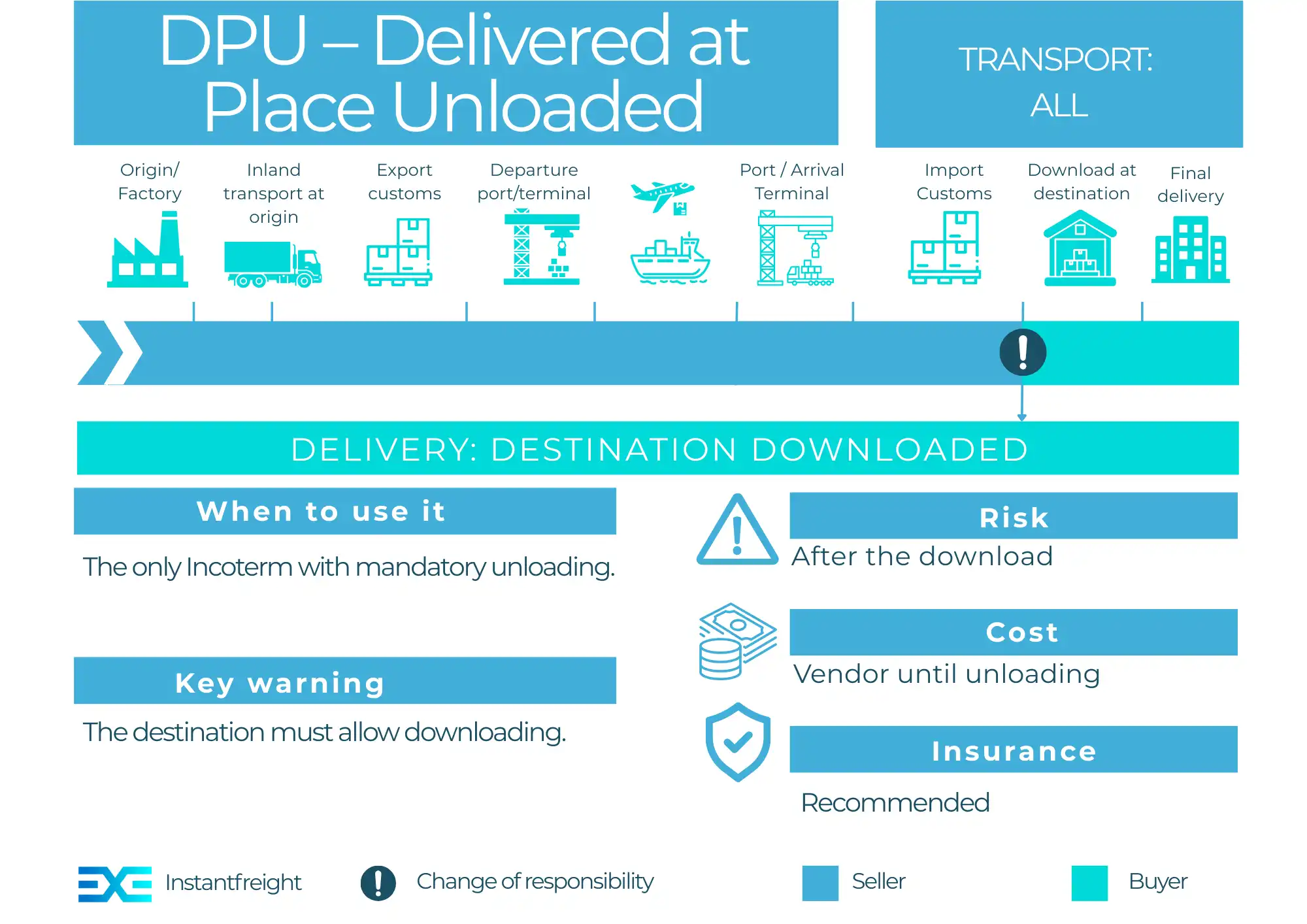Incoterm DPU (Delivered at Place Unloaded): the seller delivers and unloads your cargo
Incoterm DPU (Delivered at Place Unloaded) is one of the most important novelties of Incoterms 2020, the latest update that has been made. This rule is the only one that requires the seller to undertake the obligation to unload the goods at the agreed place of destination.
It is a very useful term if, as a buyer, you want your supplier to handle the entire logistics chain up to the unloading of the goods, assuming maximum risk up to that point.
GET A RATE FOR YOUR SHIPMENT IN SECONDS
What does DPU entail? The seller assumes risk until unloading.
Under Incoterm DPU, the seller is responsible for organising and paying for transport to an agreed place in the country of destination. Most importantly, the risk and costs transfer to the buyer only after the goods have been unloaded from the means of transport at that place.
Practical Example
You buy an industrial machine from a supplier in China under Incoterm DPU (at your warehouse in Barcelona).
The seller handles everything:
Organises inland transport in China, export customs clearance, sea freight, transport in Spain to your warehouse, and, crucially, unloading the machine from your truck.
Transfer of Risk:
If the goods suffer any damage from the crane while being unloaded at your warehouse, the risk remains with the seller.
Your responsibility:
Once the machine is on the floor of your warehouse, the risk passes to you. From that moment, you are responsible for import customs clearance, duties, and VAT.
Responsibilities under Incoterm DPU
Seller's Responsibility (complete until unloading):
Package the goods.
Manage and pay for transport from the warehouse to the place of destination.
Manage and pay for export customs clearance.
Pay for the main carriage and all costs to the destination.
Unload the goods from the means of transport at the agreed place of destination.
Assume the risk of the goods until they are unloaded.
Your Responsibility as buyer:
Assume the risk of the goods once they have been unloaded.
Manage and pay for import customs clearance, taxes, and duties.
Pay for transport from the point of unloading to your final destination, if it is not the same.
DPU vs. DAP: The key difference is unloading
DPU replaced Incoterm DAT (Delivered at Terminal) in the update we indicated, and it is more flexible, as it allows delivery anywhere, not just at a terminal as was the case with DAT.
The main difference with DAP is unloading:
DPU
The seller is responsible for unloading the goods.
DAP
The seller delivers the goods ready for unloading, but the buyer assumes responsibility and cost of unloading.
Is DPU the best option for your business?
DPU is an excellent option if you do not have the capacity or equipment to unload the goods at destination, or you do not want your teams to perform that task for whatever reason.
If you have doubts about how to implement this Incoterm or need us to manage your shipment from start to finish, our team of experts is at your disposal.
Other Incoterms
Ex Works
The least responsibility for the seller. The goods are delivered at their warehouse or factory. The buyer assumes all costs and risks from that point.
Free Carrier
The seller delivers the goods to the carrier designated by the buyer.
Carriage Paid To
The seller pays for transport to the agreed destination.
Carriage and Insurance Paid To
The seller pays for transport and insurance to the agreed destination.
Delivered At Place
The seller delivers when the goods are made available at the agreed place.
Delivered Duty Paid
The seller assumes all costs and risks until final delivery.
Free Alongside Ship
The seller delivers the goods to the carrier designated by the buyer.
Free On Board
The seller delivers when the goods pass the ship's rail.
Cost and Freight
The seller pays the cost and freight to the destination port.
Cost, Insurance and Freight
The seller pays the cost, insurance and freight to the destination port.

